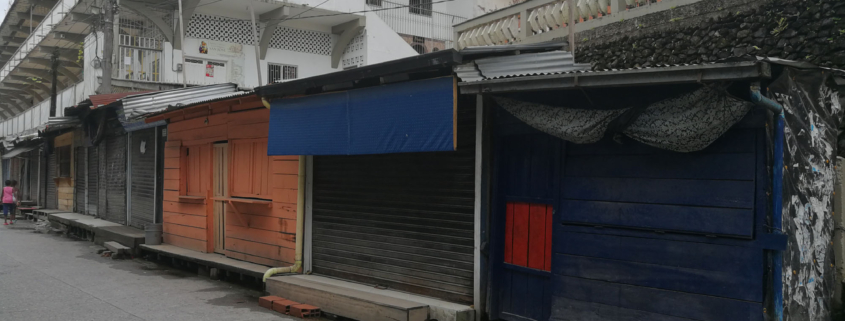Coronavirus has reached Colombia
Corona has dominated our lives for weeks. Most of the shops are closed until further notice, megacities as if they were extinct.
The pandemic has not stopped at Colombia either. Since 24 March, a nationwide quarantine has been in force there, during which the population is only allowed to leave their homes for necessary shopping and doctor’s visits. Schools and other educational institutions are closed and religious ceremonies have been cancelled.
A curfew has been imposed until 13 April. However, it may be extended. The Colombian government has thus reacted to the steadily rising number of infections in the country. On Sunday – only five days after the quarantine came into force – there were already 702 confirmed corona infections and a total of ten deaths. In the Chocó region, where CASA HOGAR is active, no cases have been documented so far. But this does not necessarily mean anything and the consequences are already being felt…
Informal sector workers are particularly hard hit
The nationwide curfew has particularly drastic consequences for people working in the informal sector. They make up 84% of the population in the Chocó region and depend on daily income, which is now disappearing completely. They often have no savings, health or unemployment insurance, which makes their situation even more difficult. Single mothers, who account for 40% of all women in Chocó, are particularly hard hit by financial losses. They are not only responsible for their children, but also have to care for older family members.
This is not the only challenge, however. Food prices have also risen significantly within a few weeks, in some cases more than doubling. Especially in Chocó, almost all basic foodstuffs have to be imported. This poses a dilemma for the people: either they stay at home and starve, or they go to work, which not only makes them liable to prosecution, but also risks infecting themselves with the virus and spreading it. This is a decision that nobody should be faced with.
Hospitals lack many things, testing is scarce
If the virus continues to spread so rapidly, it could lead to a humanitarian tragedy. The region of Istmina alone, where the “Casa Hogar Niña María” hostel is located, has a population of about 25,000. There is no medical infrastructure to treat patients suffering from COVID-19 and testing capacity is very limited. There are no laboratories. Instead, all tests must be sent to Quibdó, the capital of the department, which is two hours’ drive away. From there they are flown to Bogotá by plane. However, the way to Quibdó is already difficult and many of the flights from Quibdó to Bogotá have been cancelled.
The dormitory in Istmina had to be temporarily closed
The ten girls who live in the “Casa Hogar Niña María” residence are also affected by the Corona pandemic. On 20 March they were picked up by their parents for security reasons. They are due to return on 20 April if the curfew is not extended until then. Before the emotional farewell there was a meeting with the parents, sisters, some volunteers and the project coordinators. They sat together in a family circle and talked to each other. They talked about how things will continue now, what the crisis means for everyone and how to protect themselves.
Despite the crisis, there is also hope
The future of the people in Chocó is uncertain. In these difficult times, it is especially their faith in God that gives them stability. But the community also plays an important role. Although most of them have little of their own, they help each other, share food or go to the market for others.
Often creative solutions are found: Some churches, for example, practice “pico y cédula”. This means that only people whose identity card ends in a certain number are allowed to go out and do their shopping on a given day. This is not only to reduce the rush to the supermarkets, but also to ensure supply.
Nobody knows how long the people in the Chocó can stand this state of affairs. Many of them would “rather die of flu than hunger”. But in spite of everything, they still have hope: that the virus everyone is talking about at the moment will not hit them quite as hard, that they will also get through this crisis together and that everything will soon return to the old ways.
CASA HOGAR, however, cannot simply hold out and look away. Our team is working around the clock in Chocó, in Cali and in Germany to put together a hot needle package of measures to mitigate the consequences of what has already happened and to reduce the danger of what is yet to come. We are in close contact with the local authorities and projects are already being set up. We will provide timely information on the exact measures to be taken. Just this much already: Donations to CASA HOGAR help us all to survive the crisis together!
Information about COVID in Colombia (spanish)
Information about COVID in Chocó (spanish)



